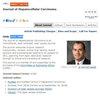Recurrence of Hepatocellular Carcinoma in Patients with Low Albumin-Bilirubin Grade in TACE Combined with Ablation: A Random Forest Cox Predictive Model
IF 4.2
3区 医学
Q2 ONCOLOGY
引用次数: 0
Abstract
Purpose: The aim of our study was to investigate the relationship between albumin-bilirubin (ALBI) grade and recurrence in patients who underwent TACE sequential ablation. We developed and validated a nomogram to predict low levels of ALBI patients’ recurrence.Patients and Methods: A total of 880 patients undergoing TACE combined ablation at Beijing Youan Hospital from January 2014 to December 2021 were retrospectively enrolled, including 415 patients with L-ALBI (≤-2.6) and 465 patients with high levels (>-2.6) of ALBI (H-ALBI). L-ALBI patients were randomized in a 7:3 ratio into the training cohort (N=289) and validation cohort (N=126). Multivariate Cox regression followed by random survival forest was carried out to identify independent risk factors for prediction nomogram construction. An examination of nomogram accuracy was performed using the C-index, receiver operating characteristic (ROC), calibration curves, and decision curve analysis (DCA) curves. According to the nomogram, the patients were divided into low-risk, intermediate-risk, and high-risk groups. Kaplan-Meier (KM) curves were applied to compare the difference in recurrence-free survival (RFS) among the three groups.
Results: The median RFS in L-ALBI patients was significantly longer than the H-ALBI patients (40.8m vs 20.1m, HR:1.71, 95% CI:1.44– 2.04, P< 0.0001). The nomogram was composed of five variables, such as age, Barcelona Clinic Liver Cancer (BCLC) stage, globulin, gamma-glutamyl transferase to lymphocyte ratio (GLR), and international normalized ratio (INR). The C-index (0.722 and 0.731) and 1-, 3-, and 5-year AUCs (0.725, 0.803, 0.870, and 0.764, 0.816, 0.798) of the training and validation cohorts proved the good predictive performance of the nomogram. Calibration curves and DCA curves demonstrated good consistency and good clinical utility. There were significant differences in RFS between the low-risk, intermediate-risk, and high-risk groups (P< 0.0001).
Conclusion: L-ALBI Patients who underwent TACE combined ablation had better recurrence-free survival than patients with H-ALBI. The nomogram developed and validated in our study had good predictive ability in recurrence for L-ALBI patients.
Keywords: hepatocellular carcinoma, HCC, ablation, nomogram, recurrence, albumin-bilirubin, ALBI
白蛋白-胆红素分级低的 TACE 合并消融患者的肝细胞癌复发:随机森林考克斯预测模型
目的:我们的研究旨在探讨白蛋白-胆红素(ALBI)分级与接受TACE序贯消融术患者复发之间的关系。我们开发并验证了一种预测低水平 ALBI 患者复发的提名图:回顾性纳入2014年1月至2021年12月在北京佑安医院接受TACE联合消融术的880例患者,包括415例低水平ALBI(≤-2.6)患者和465例高水平(>-2.6)ALBI(H-ALBI)患者。L-ALBI患者按7:3的比例随机分为训练组(289人)和验证组(126人)。采用多变量 Cox 回归和随机生存森林来确定独立的风险因素,以构建预测提名图。使用 C 指数、接收者操作特征(ROC)、校准曲线和决策曲线分析(DCA)曲线对提名图的准确性进行了检验。根据提名图,患者被分为低风险组、中风险组和高风险组。采用卡普兰-梅耶(KM)曲线比较三组患者无复发生存期(RFS)的差异:结果:L-ALBI 患者的中位无复发生存期明显长于 H-ALBI 患者(40.8m vs 20.1m,HR:1.71,95% CI:1.44- 2.04,P< 0.0001)。提名图由五个变量组成,如年龄、巴塞罗那临床肝癌(BCLC)分期、球蛋白、γ-谷氨酰转移酶与淋巴细胞比值(GLR)和国际正常化比值(INR)。训练组和验证组的 C 指数(0.722 和 0.731)以及 1 年、3 年和 5 年的 AUC(0.725、0.803、0.870 和 0.764、0.816、0.798)证明了提名图具有良好的预测性能。校准曲线和 DCA 曲线显示出良好的一致性和临床实用性。低危、中危和高危组之间的 RFS 有明显差异(P< 0.0001):结论:接受 TACE 联合消融术的 L-ALBI 患者的无复发生存率优于 H-ALBI 患者。我们研究中开发和验证的提名图对 L-ALBI 患者的复发具有良好的预测能力。 关键词:肝细胞癌,HCC,消融,提名图,复发,白蛋白-胆红素,ALBI
本文章由计算机程序翻译,如有差异,请以英文原文为准。
求助全文
约1分钟内获得全文
求助全文

 求助内容:
求助内容: 应助结果提醒方式:
应助结果提醒方式:


